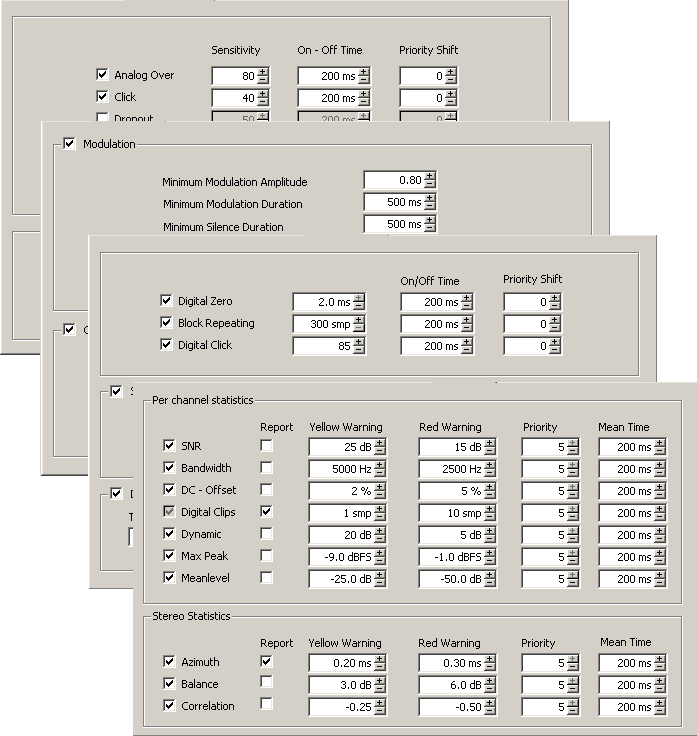Audio Analysis
Audiofile-Inspector
The well-known Audiofile-Inspector from the QUADRIGA Archive Solution is now available for DOBBIN.

Audio files are checked with regards to their properties e.g. start and end of the modulation, average amplitude, average dynamics as well as audio errors that have been brought over from the analog domain. These errors include clicks, hum, clips, drop-outs etc.
The algorithms for determining the properties, as well as the recognition of errors, can be switched on or off. The sensitivity can be adapted with various parameters.
The user can differentiate between the output values of the algorithms in the following ways: errors and unique properties such as start of the modulation or the beginning of a segment that contains hum are described as Events. Signal properties that relate to the whole file e.g. average volume are described as Means. The recognized Events are saved as technical metadata within the Broadcast Wave File (BWF). In addition, the Events are exported as an XML file.

Features:
- Modulation, Pauses and Critical Sections
- Clicks and Cracks
- Buzz
- Noise floor
- Direct Current Transmission
- Maximum Level
- Azimuth
- Correlation
- Stereo / Music recognition
- Bandwidth
- Dynamic
- Average Level
- Balance
Digital Error Checker

The Digital Error Checker FPU is used to check audio files for digital errors. Recognized errors are saved in the BWF structure of the analyzed files and are exported as an XML file.

Following errors can be detected:
- block repetition
- digital clicks
- digital clipping
- hold errors
- sample repetition
- zero positions
Damage Detector
In contrast to our Digital Error Checker, which checks for damage done by digital causes, the Damage Detector scans for audio which was damaged in the analog domain. Typical example: Extreme audio distortion by wrongly coded material, mutes or hangs by DAT or U-Matic recordings. Also, errors in the internal structure of linear audio, like wrong chunk alignment, can be found.
Applause Detector
Applause Detection on a high level. Recordings of classical music sometimes consists of long passages of applause. While tailoring those for broadcast, this can be very irritating. Applause should not exceed a speficied amount. The Applause Detector is able to locate these parts and - in combination with the AudioFile Composer - cut them virtually inaudible.
The Applause Detector analyses incoming audio data - found applause parts are logged with appropriate markers. Additionally, detection accuracy is logged for every found part.
The Applause Detector is designed for applause typical in recordings of classical music concerts: Clapping of a medium to large audience, characteristically staying the same, without distinguished jubilation or whistling.
MPEG Audio-Check
Checks audio coded in mpeg format. The material is reliably tested for inconsistencies in audio data as well as header data. Additional data for Musicam and Musifiles is not declared as corrupt data, but recognized correctly. Clean input material is essential for a usable archive.
MediaInfo

The MediaInfo FPU provides a vast array of information for lots of different audio, video and container file formats. This information can be directly used to define processing rules in the Decider, allowing format dependent workflow chains. The XML files in your DOBBIN Output folder of a MediaInfo Job can then be viewed with your web browser.
Supported Formats of the MediaInfo FPU:
- AAC (aac)
- AC3 (ac3)
- Amiga IFF/SVX8/SV16 (iff)
- Apple/SGI (aiff/aifc)
- Audio Visual Research (avr)
- Berkeley/IRCAM/CARL (irca)
- CDXA, like Video-CD (dat)
- DTS (dts)
- DVD-Video (ifo)
- Ensoniq PARIS (paf)
- FastTracker2 Extended (xi)
- Flac (flac)
- Matlab (mat)
- Matroska (mkv/mka/mks)
- Midi Sample dump Format (sds)
- Monkey's Audio (ape/mac)
- Mpeg 1&2 container (mpeg/mpg/vob)
- Mpeg 4 container (mp4)
- Mpeg audio specific (mp2/mp3)
- Mpeg video specific (mpgv/mpv/m1v/m2v)
- Ogg (ogg/ogm)
- Portable Voice format (pvf)
- Quicktime (qt/mov)
- Real (rm/rmvb/ra)
- Riff (avi/wav)
- Sound Designer 2 (sd2)
- SoundFoundry WAVE 64 (w64)
- Sun/NeXT (au)
- Windows Media (asf/wma/wmv)

